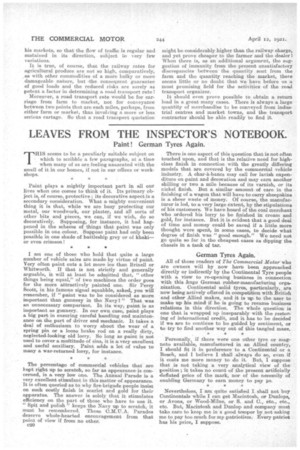LEAVES FROM THE INSPECTOR'S NOTEBOOK.
Page 16

If you've noticed an error in this article please click here to report it so we can fix it.
Paint ! German Tyres Again.
THIS seems to be a peculiarly suitable subject on which to scribble a few paragraphs, at a time when many of us are feeling nauseated with the smell of it in our homes, if not in our offices or workshops.
Paint plays a raightly important part in all our lives when one cornea to think of it. Its primary abject is, of course, protective • its decorative aspect is a secondary coneideration, What a mighty convenient thing it is that, while we are busy protecting our metal, our woodwork, our plaster, and all sorts of other bits and pieces, we can, if we wish, do so decoratively. Supposing, for instance, it had happened in the scheme of things that paint was only possible in one colour. Suppose paint had only been possible in one shade of battleship grey or of khaki— or even crimson!
I am one of those who hold that quite a large number of vehicle sales are made by virtue of paint. Very often paint cuts a lot more ice than Brinell or Whitworth. If that is not strictly and generally arguable, it will at least be admitted that, "other things being equal," of two machines the order goes for the more attractively painted one. Sir Percy Scott, in his famous signal squabble, asked, you will remember, if "paint was to be considered as more important than gunnery in the Navy?" That was an unnecessary comparison. In its way, paint is as important as gunnery. In our own ease, paint plays a big part in ensuring careful handling and maintenance on the part of driver and mechanic. It takes a deal of enthusiasm to worry about the wear of a spring pin or a loose brake rod on a really dirty, neglected-looking old lorry. So long as paint is not used to cover a multitude of sins, it is a very excellent and useful auxiliary. Paint adds a lot of value to many a war-returned lorry, for instance.
The percentage of commercial vehicles that are kept right up to scratch, so far as appearance is concerned, is a very low one. The Annual Parade is a very excellent stimulant in this matter of appearance. It is often queried as to why fire-brigade people insist on such costly finish in scarlet and gold for their apparatus. The answer is solely that it stimulates efficiency on the part of those who have to use it. "Spit and polish'? keeps the Navy up to scratch, it must be remembered. These 0.M.U.A. Parades deserve whole-hearted encouragement from that point of view if from no other. c20 There is one aspect of this question that is not often touched upon, and that is the relative need for highclass finish in connection with the greatly differing models that are covered by the commercial vehicle industry. A char-h-banes may call for lavish expenditure on paint and decoration and may earn another shilling or two a mile because of its varnish, or its nickel finish. But a similar amount of care in the finishing of a wagon that will have to carry sheepskins is a sheer waste of money. Of course, the manufacturer is led, to a very large extent, by the stipulations of his customers. We have heard of the coal merchant who ordered his lorry to be finished in cream and gold, for instance. But it is evident that a good deal of time and money could be saved if a little more thought were spent, in some cases, to decide what degree of finish was "good enough." We need not go quite so far in the cheapeet cases as dipping the chassis in a tank of tar.
German Tyres Again.
All of those readers of The Commercial Motor who are owners will by now have been approached directly or indirectly by the Continental Tyre people with a view to re-opening business in connection with this huge German rubber-manufacturing orgae nization. Continental solid tyres, particularly, are now being actively offered in competition with British and other Allied makes, and it is up to the user to make up his mind if he is going to resume business relations in this direction. The whole question is one that is wrapped up inseparably with the restoring of international 'credit, and it has to be decided if we are to continue to be guided by sentiment, or to try to find another way out of this tangled maze.
Personally, if there were one other tyre or magneto available, manufactured in an Allied country, I should fit it in preference to a Continental or a Roach, and I believe I shall always do so, even if it costs me more money to do it. But, I suppose that is not taking a very analytical view of the position ; it takes no count of the present artificially deflated price of the mark, nor of the necessity of enabling Germany to earn money to pay ps.
Nevertheless, I am quite satisfied I shall not buy Continentals while I can get Macintosh, or Dunlop; or Avails, or Wood-Milne, or S. and C., etc., etc., etc. But, Macintosh and Dunlop and company must take care to keep me in a good temper by, not asking me to pay too much for my patriotism. Every patriot has his price, I suppose.
































